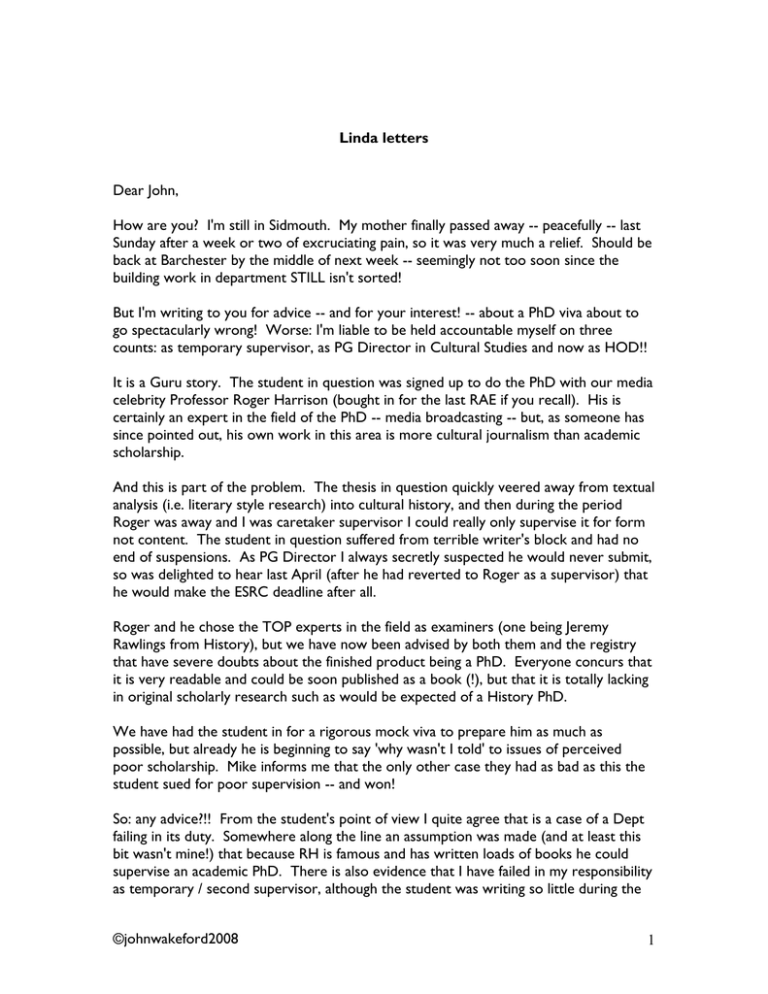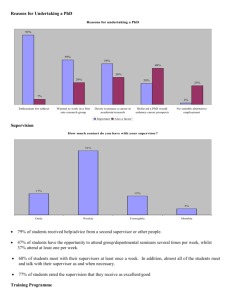Dear John, Linda letters
advertisement

Linda letters Dear John, How are you? I'm still in Sidmouth. My mother finally passed away -- peacefully -- last Sunday after a week or two of excruciating pain, so it was very much a relief. Should be back at Barchester by the middle of next week -- seemingly not too soon since the building work in department STILL isn't sorted! But I'm writing to you for advice -- and for your interest! -- about a PhD viva about to go spectacularly wrong! Worse: I'm liable to be held accountable myself on three counts: as temporary supervisor, as PG Director in Cultural Studies and now as HOD!! It is a Guru story. The student in question was signed up to do the PhD with our media celebrity Professor Roger Harrison (bought in for the last RAE if you recall). His is certainly an expert in the field of the PhD -- media broadcasting -- but, as someone has since pointed out, his own work in this area is more cultural journalism than academic scholarship. And this is part of the problem. The thesis in question quickly veered away from textual analysis (i.e. literary style research) into cultural history, and then during the period Roger was away and I was caretaker supervisor I could really only supervise it for form not content. The student in question suffered from terrible writer's block and had no end of suspensions. As PG Director I always secretly suspected he would never submit, so was delighted to hear last April (after he had reverted to Roger as a supervisor) that he would make the ESRC deadline after all. Roger and he chose the TOP experts in the field as examiners (one being Jeremy Rawlings from History), but we have now been advised by both them and the registry that have severe doubts about the finished product being a PhD. Everyone concurs that it is very readable and could be soon published as a book (!), but that it is totally lacking in original scholarly research such as would be expected of a History PhD. We have had the student in for a rigorous mock viva to prepare him as much as possible, but already he is beginning to say 'why wasn't I told' to issues of perceived poor scholarship. Mike informs me that the only other case they had as bad as this the student sued for poor supervision -- and won! So: any advice?!! From the student's point of view I quite agree that is a case of a Dept failing in its duty. Somewhere along the line an assumption was made (and at least this bit wasn't mine!) that because RH is famous and has written loads of books he could supervise an academic PhD. There is also evidence that I have failed in my responsibility as temporary / second supervisor, although the student was writing so little during the ©johnwakeford2008 1 period in which I looked after him my main concern was to encourage him enough to hang in. I really only saw bits of the preliminary chapters, the problem being that he apparently never went beyond them! From your point of view this is a wonderful warning story of how EVERY supervisor must be given proper training for the job in hand; and it is also a warning about a thesis shifting disciplines since myself and others in Cultural Studies wouldn't necessarily spot the weaknesses of this one in historical terms. My faint hope here is that the examiners will be kind enough to allow a resubmission and that the student will agree to do this. I guess the Cultural Studies Dept will have to accept liability, but damage limitation is the name of the game? In abstract terms, an interesting guru story though -- is it not?!! What do you suggest? Best wishes Linda Team task Prepare a response to Linda’s letter and write the main points on the acetate provided. ©johnwakeford2008 2 Linda’s second letter John In brief -- it seems as though it might be OK! As I understand it the viva went well despite the outcome (12 month major revisions) and the candidate has used to the word 'fair' in his assessment of it to me. Clearly that mock viva was absolutely crucial in preparing him for what was to come, and I think he convinced them he was quite capable of making the changes needed. He has asked for and we have suggested a period of intercalation before he begins the corrections (he has just got a job!) and I am about to write to History to see if we can buy someone in to be a new supervisor. No idea if any of it has got back to RH yet or what his reaction is! One particular thing I am taking away from it is the necessity of determining 'originality' per discipline. The list from Estelle Phillips that Ivor uses maybe lulls students into a false sense of believing that anything can count as originality -- but not for Jeremy Rawlings evidently! I think this is an excellent case study in the making! Linda Team task On the acetate provided list the main advice you would now have for 1. postgraduate research students 2. supervisors 3. examiners 4. institutions ©johnwakeford2008 3
